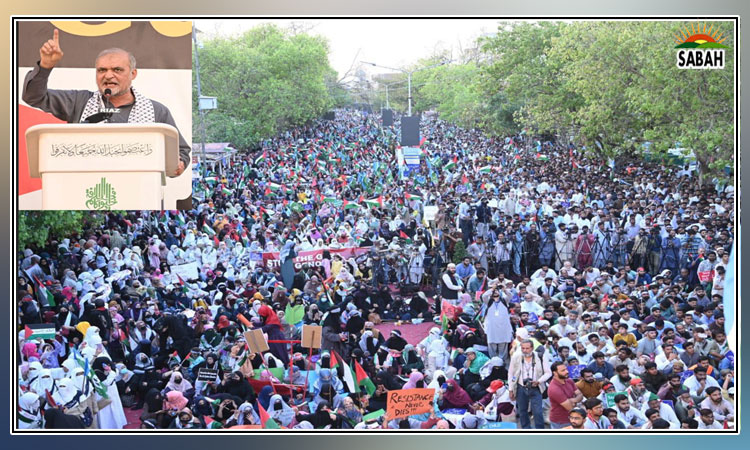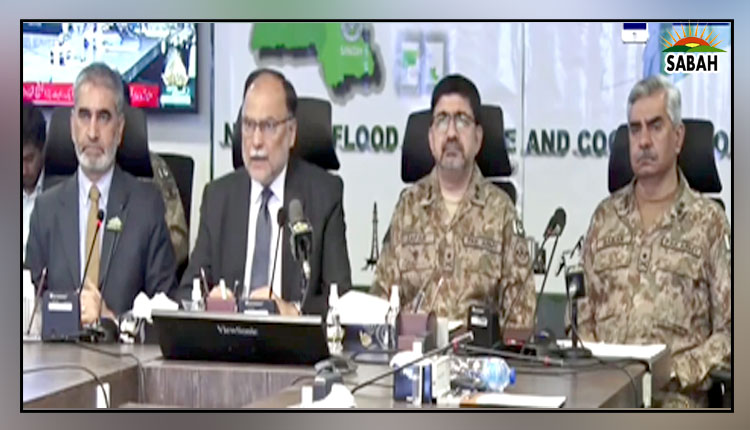Ahsan Iqbal appeals Pakistanis, Pakistani expatriates & int’l community to help Pakistan in this hour of need
ISLAMABAD, Sep 03 (SABAH): Minister for Planning, Development and Special Initiatives Ahsan Iqbal Chaudhry has appealed Pakistanis, Pakistani expatriates and the international community to help Pakistan in this hour of need. He said that the government of Pakistan supported by all of its functionaries will leave no stone unturned to bring normalcy back in flood affected areas at the earliest possible time. Ahsan Iqbal said that we look forward to support to our development partners, international community so that we can together help millions of these Pakistanis, who have been displaced, whose livelihoods have been destroyed and to again go back to their homes and start living a normal life.
This appeal was made by Ahsan Iqbal while briefing the media persons at National Flood Response and Coordination Center in Islamabad on Saturday along with Chairman NDMA Lieutenant General Akhtar Nawaz Satti, DG ISPR Major General Babar Iftikhar and Chairman National Flood Response Major General Zafar Iqbal.
Ahsan Iqbal said that he wants to make appeal to the international community that Pakistan is facing a massive climatic disaster and human tragedy, which is the outcome of an environmental degradation by global warming and is not of its own making. Ahsan Iqbal said that Pakistan’s carbon omissions are less than one percent but Pakistan is the 7th most vulnerable country for climatic disaster. He said that the scale warrants a major humanitarian response for which support of international community has already started poring in, for which Pakistan is extremely grateful; however as I have said that the scale of devastation is massive and requires immense humanitarian response for 33 million people.
Ahsan Iqbal assured that the government will leave no stone unturned to bring normalcy back in the lives of flood affected people of the country. He said the government or any institution cannot single handedly overcome this tragedy. He said the entire nation will have to get united to steer the country out of this challenge.
Ahsan Iqbal also briefed the media about the rehabilitation of critical infrastructure of roads, power and telecommunication.
Rainfall over 500% above the normal mark has unleashed devastating floods across the country, he said, adding that over one million houses were damaged due to the floods.
The minister said that nearly 5,000km of roads were damaged, with the situation bleakest in Balochistan.
Nearly 10 days back, 14 critical highways that connect Balochistan to the rest of the country and are crucial for the economy, were not accessible due to heavy flooding, he said.
“I am pleased to say that our National High Authority, engineers from the armed forces, and the civil administration cleared 11 of the critical highways,” he said, with continuous works underway to clear the remaining three.
The planning minister said that despite the intensity of the calamity, the authorities and institutions were working to ensure that connectivity is restored across the country.
Ahsan Iqbal said that 81 grid stations were non-functional in the last 15 days, but after the expedited work, 69 have been restored and 12 will be functional soon — leading to the restoration of electricity in several parts of the country.
The federal minister said that 881 feeders were affected in some way or the other, resulting in the disruption of electricity. Among them, 758 have been made functional and 123 will be restored later.
Eight transmission lines were hampered, causing power outages, especially in Balochistan, he said, adding that six have been restored, while the rest will be restored soon.
The planning minister said that 3,500 telecommunication towers were damaged, which caused disruption in communication.
Services were down in the flood-hit areas for several days in the initial phase of the flooding, hampering rescue works as well, he said. “Now, only 600 are non-functional, while the rest are fully functional.”
He added that Prime Minister Shehbaz Sharif has directed authorities to ensure that the remaining telecommunication towers — 2,900 — are restored within the next 48 hours. The planning minister said that the Pakistan Telecommunication Authority (PTCL) is working with relevant companies to make sure that the communication lines are restored at the earliest.
Giving the latest updates, Chairman NDMA Lieutenant General Akhtar Nawaz Satti said the calamity has so far killed 1265 people and injured 12,577. He said that 735,584 livestock were left dead, and 1,427,039 houses have been damaged.
He said that due to internal displacement, more than 500,000 people are currently living in relief camps across Balochistan, Khyber Pakhtunkhwa, Sindh, and Punjab.
He said rescue and relief operation is continuing in flood affected areas. He said we have provided four hundred and twenty thousand tents and keeping in view the heavy demand of tents, an effort has been made to build the capacity of tent manufacturing. He said fifty-seven thousand and four hundred food packages have been distributed amongst the flood victims.
The Chairman NDMA said there has been a good international response to the UN flash appeal for the assistance of flood affected people. He said twenty-nine relief goods flights have been received over the last four days. These included ten from Turkey, eleven from the UAE, four from China, two from Qatar and one each from Uzbekistan and France. He said these flights carried goods such as 2728 tents, ninety-eight tons food packages, fifty boats and fifty-six tons medicines.
Lieutenant General Akhtar Nawaz said that monsoon rains began almost three weeks before their expected schedule and they were “unprecedented”. The NDMA chairman said that heavy rainfall was expected, but the downpour was exponentially above the forecast, resulting in extreme flooding across the country.
The rains — which were to occur in Khyber Pakhtunkhwa, Azad Kashmir, and northern areas — shifted from their traditional routes and occurred in Balochistan’s eastern areas, Southern KP, Punjab’s DG Khan and Rajanpur, and across Sindh. “The rains were extremely heavy in Sindh, which led to an unprecedented situation,” he said.
Briefing the media about the rescue and relief activities being carried by the armed forces, Director General ISPR Major General Babar Iftikhar said they are engaged in the rescue and relief efforts over the last two months. He said, during this period, we have rescued the people and also provided them with relief items. He said Pakistan Army has established one hundred and forty-seven relief camps wherein relief has been provided to fifty thousand flood victims. He said eighty-three thousand victims have been provided with free medical treatment in the two hundred and fifty medical camps.
DG ISPR Major Babar Iftikhar paid rich tribute to Balochistan Corps Commander Lt Gen Sarfraz Ali and others who were martyred in a helicopter crash while serving the nation amid floods. Corps commander conferences held in July and August reaffirmed commitment to provide all possible help to flood affectees and Chief of Army Staff General Qamar Javed Bajwa gave special directions in this regard, he added.
“The army chief visited flood-affected areas and monitored the rescue operations,” the spokesperson said, adding that the army officials rescued people despite bad weather and other challenges.
“Army set up 147 relief camps across the country [to facilitate the flood victims],” Babar Iftikhar added. He maintained that 50,000 people were given relief in the camps.
Pakistan Air Force rescued over 1,521 people trapped in the floods, the military’s spokesperson said. Urging people and philanthropists to donate to the flood victims, the army spokesperson said that 284 flood relief collection points have been established across the country.
Minister for Planning and Development Ahsan Iqbal, Director General of the Inter-Services Public Relations Major General Babar Iftikhar, Chairman National Flood Response Major General Zafar Iqbal, National Disaster Management Authority (NDMA) Chairman Lieutenant General Akhtar Nawaz Satti, deputy chairperson and national coordinator of the NFRCC, and a representative of the metrological department attended the earlier meeting of the newly-established body.
The forum was apprised of the latest flood situation in the country and the response measures taken to rescue and provide relief to the affected people. The attendees were also informed of the rehabilitation plan for the affected areas, communication, and infrastructure.
Earlier this week, the incumbent coalition government decided to establish the NFRCC to cope with the flood situation and rehabilitate the impacted people.
The decision was made at a meeting of the allied parties chaired by Prime Minister Mian Muhammad Shehbaz Sharif. The NDMA chief briefed the meeting about the situation of floods in the country and relief activities.
PM Shehbaz Sharif said that the centre would “serve as a bridge between disaster management authorities, donors and government institutions”.
According to the premier, the NFRCC would collect and analyse the latest information and pass it on to relevant government agencies, as well as oversee rescue and relief work, including the restoration of infrastructure.












